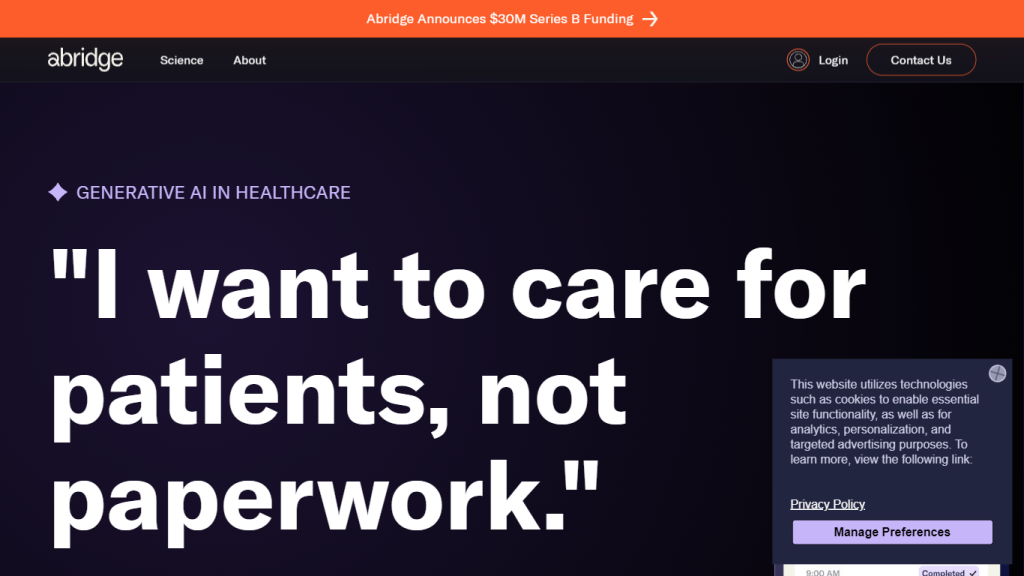What is Abridge?
Abridge spearheads a revolution in medical documentation with the use of AI that, in real time, transforms patient-clinician conversations into structured clinical note drafts. Their AI autonomously writes complete and detailed notes from live interactions, reducing paperwork and administrative work dramatically for healthcare professionals. With such an innovative solution, clinicians can save up to 2-3 hours each day and spend more time in the care of the patients rather than on manual documentation. Abridge’s AI has been engineered to be trusted and verified with matchless auditability and integration ease into the electronic medical record systems most health systems, like Epic, use today.
Approved by clinicians to combat burnout, Abridge has also been clinically validated by the leading healthcare innovators to demonstrate its ability to augment the efficiency of the medical practice in more than 45 specialties.
Abridge’s Key Features & Benefits
Real-time Clinical Note Drafting:
Abridge can have this AI create draft clinical notes from live, direct patient-clinician conversations that seamlessly integrate into systems like Cerner and Epic. Because it integrates very well with EMRs, it makes the workflow in that regard great.
EMR Integration with Epic:
Being the first partner in the Partners and Pals program at Epic, Abridge has presented a generative AI solution deeply integrated with clinical workflows within Epic.
Burnout Reduction:
Clinicians save 2-3 hours daily due to a reduction in time to document, thus giving more time for patient care and reducing burnout.
Trusted and Verified by Health Professionals:
Vouched for and supported by top medical experts; over 91% of notes drafted through Abridge’s AI required very minimal clinician input.
Future-Proof Healthcare Solution:
Built by a diverse team of AI-native scientists and clinicians, Abridge’s platform ensures always-on transparent auditability, clear accountability, and is built to evolve as the needs of healthcare evolve.
Abridge Use Cases and Applications
Abridge is created for use in numerous healthcare environments, thereby offering huge benefits to clinicians and healthcare enterprises alike, as well as to patients. Specific examples of how Abridge can be used are as follows:
-
Clinicians:
The automation of the documentation process opens up more time to be spent with each patient, thereby creating a better healthcare experience and less burnout for the clinician. -
Healthcare Enterprises:
This would also mean that the conversations between patients and clinicians yield more value for medical practices by improving overall efficiency. -
Patients:
Care will be managed better since clinicians can invest quality time into patients.
Case studies have demonstrated the efficacy of Abridge’s AI solution in improving medical practice efficiency across more than 45 specialties, thus proving its versatility and wide applicability.
How to Use Abridge
The use of Abridge is very simple in terms of the process it requires:
-
Integration:
Seamlessly integrate Abridge with your current EMR system, such as Epic. -
Engagement:
During patient-clinician interactions, Abridge listens with its AI and converts the conversations into structured clinical note drafts in real time. -
Review:
Clinicians review the drafted notes, editing as appropriate, and then finalize and save the notes in the EMR.
Tips and Best Practices:
- Ensure a clear and uninterrupted conversation during patient interactions for the best AI note drafting results.
- Provide regular feedback on the AI-generated notes to allow improvement over time.
How Abridge Works
Abridge uses sophisticated deep AI technology to convert conversations in real-time into structured clinical notes, powered by advanced natural language processing algorithms combined with machine learning models that understand both medical terminology and context.
While a clinician is talking with a patient, Abridge’s AI listens to that conversation and, in real time, processes the information and generates structured drafts of clinical notes. Afterward, these are reviewed by the clinician for accuracy, finalized, and then saved into the EMR.
Pros and Cons of Abridge
Pros:
- With this technology, lots of time is saved for clinicians, which they can use to care more for their patients.
- There is a decrease in clinician burnout due to decreased administrative work.
- Integrations into existing systems of EMR, hence assured smooth workflow; High accuracy with least intervention from the clinician to review the drafted notes.
Possible Drawbacks:
- Initial setup may require some technical support for integration.
- Critical medical documentation heavily relies on AI accuracy.
Abridge FAQs
What does Abridge’s AI do?
Abridge’s AI converts live patient-clinician conversations into structured clinical note drafts in real time and seamlessly integrates them into the existing EMR system.
How does Abridge benefit clinicians?
Abridge’s AI keeps roughly 2-3 hours free each day for clinicians from automating note-taking and frees them to have more time available in patient care.
Is the AI solution of Abridge trustworthy and verifiable?
Yes, Abridge is designed to be transparent and verifiable, in turn making health care providers trust AI-generated notes, and integrations with EMRs like Epic are auditable down to the core.
Who does Abridge benefit?
Abridge benefits clinicians, health enterprises, and patients alike. Clinicians reduce burnout; enterprises capture more value from conversations; patients better manage their care.
What is the latest funding for Abridge?
Abridge has announced the close of a $30M Series B funding round, led by some of the leading healthcare innovators, to round out and refine its generative AI solution for medical conversations.










